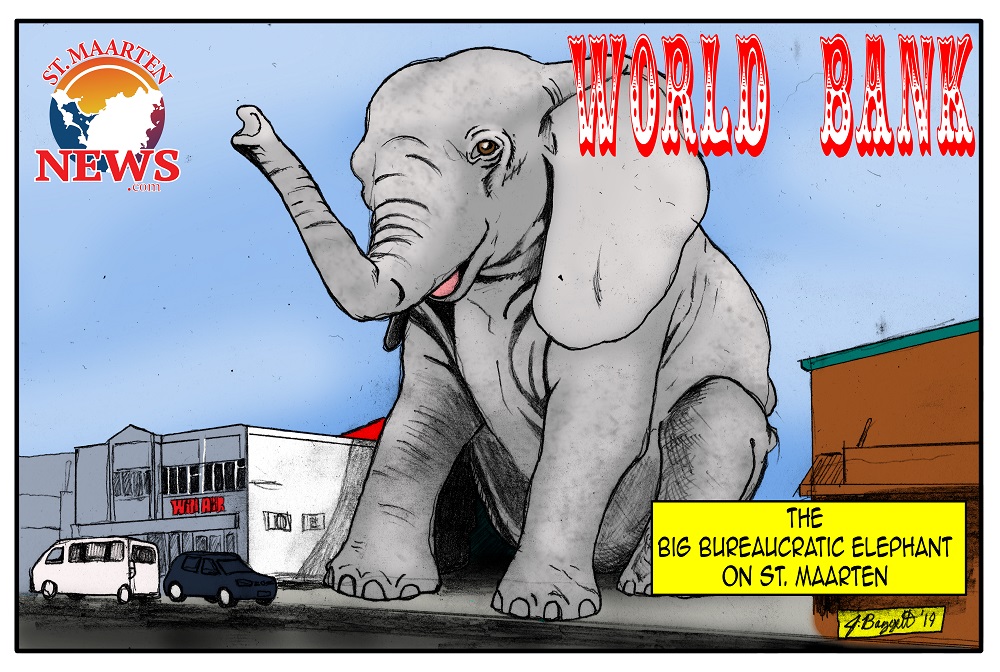Advertisement

By Hilbert Haar
Without further ado, former Finance Minister Michael Ferrier has pointed to the procedures the World Bank uses for the distribution of recovery-dollars from the trust fund to explain why post Hurricane Irma home repairs are progressing at a snail’s pace. There is however more to say about this issue – much more.
In its 2018 annual report the World Bank identifies one of the bottlenecks it has encountered: procurement constraints due to market limitations. It seems that the World Bank has trouble finding local companies to execute recovery projects. According to its report, this is partially due to the fact that local companies are already busy with post-Irma projects. That makes it difficult to accept additional work. “The small size and capacity of the market makes it difficult to find firms that can respond to demand for goods, works and services in a flexible and rapid manner.”
The report also acknowledges that its procurement procedures are part of the problem in dealing with local companies: “The lack of familiarity with competitive procurement procedures required by the World Bank leads to incomplete bids and inflated prices.”
For these reasons the World Bank is looking for companies that operate regionally or internationally. But it is clear that the procedures the bank requires are making it difficult for local companies to participate in trust fund-paid recovery projects.
Again, this is not the only stumbling block. The government of St. Maarten is also playing a negative role. This appears from a report published by the office of the Ombudsman, entitled Home Repair: A Revelation of a Social Crisis.
The Ombudsman of the Netherlands and St. Maarten’s Ombudsman Gwendolien Mossel addressed the slow pace of post-Irma home repairs with the governments in The Hague and in Philipsburg already in July 2018, urging them to speed up the process. But in the year that has passed since then there has been little progress. According to the Ombudsman-report, this is due to “St. Maarten’s lack of operational staff and expertise and the bureaucratic, complex and time-consuming World Bank procedures.”
Point taken; those procedures – based on the principles of good governance – do play a part. But they are not the overwhelming reason for the slow pace of home repairs: the Ombudsman devotes just one line to it in its 35-page report which mentions a host of other bottlenecks that make clear that the rules of engagement established by the local government also have something to do with this social crisis.
The Council of Minister set for instance a monthly income-ceiling of 4,000 guilders gross. Applicants with a higher income do not qualify for home repair assistance. This way, 29 applicants were denied financial aid. The program also does not offer help for catastrophically damaged homes, or to persons who cannot prove ownership.
Furthermore there is a chronic lack of social housing and post-disaster planning is insufficient due to a lack of data. Hurricane shelter-residents do not qualify for financial aid and undocumented people – who may well contribute to the government’s coffers for instance in terms of wage tax – cannot turn to the government for help either.
The reasons why so many people are still living in dismal conditions more than two years after Hurricane Irma are therefore complex and cannot be attributed to a single factor – like the time-consuming World Bank procedures. To call the World Bank the elephant in the room may be appropriate but it is not the only elephant.
Companies that are not familiar with the World Bank procedures should hire expertise to overcome their own shortcomings if they want a piece of the recovery cake. That would certainly help to speed up World Bank procedures.
The government has to step up to the plate as well by taking another good look at the rules that exclude too many people from sorely needed financial help. To quote Greta Thunberg: “I want you to act as if your house is on fire; because it is.”
###
Relevant links:
Former Minister Ferrier: “The trust fund is failing”
Ferrier: It is never nice to say “I told you so”
Dr. J. Foundation urges community to donate to the Hurricane Irma Reintegration Program
Transition-shelter: a place for privacy, dignity and respect




